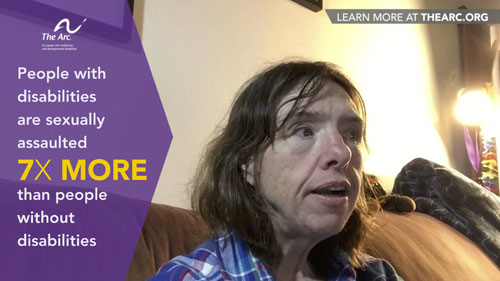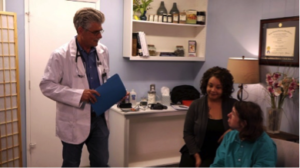Kecia’s #MeToo Story
WARNING: This article contains descriptions of sexual assault
Individuals with disabilities are seven times more likely to be victims of sexual assault than those without disabilities. Kecia, sexual assault survivor-turned-advocate, is one of those individuals. She was raped, but justice was denied to her because of the failings of our criminal justice system. This is her story, in her words.
 I met this man at a self-advocacy meeting and we had very similar hobbies. I invited Michael back to my house to play chess with me. As soon as Michael entered my house, he started to kiss me and then drag me towards the couch where he proceeded to rape me.
I met this man at a self-advocacy meeting and we had very similar hobbies. I invited Michael back to my house to play chess with me. As soon as Michael entered my house, he started to kiss me and then drag me towards the couch where he proceeded to rape me.
I called the police after Michael left to report the rape. They sent a female investigator to take my report. After asking me questions, the investigator told me they would interview Michael about the rape and get back with me. Michael lied and said I wanted to have sexual contact with him. I was informed by a detective later in the week that the case closed since it was a “he said/she said” incident. For the record, I absolutely didn’t want to have any sexual contact with Michael whatsoever.
Shaken up, I called my social service agency for help and reported the rape to my case manager. My case manager listened and filled out a Special Incident Report (SIR) without offering any additional support.
I checked back with my case manager but she didn’t respond back to me for many days. I had to keep calling her to get a response. I never received a copy of the SIR report.
I am unaware if my case manager reported my rape to APS because I never received a visit from a social worker. I am totally unaware if my case manager told anyone else about my rape because once she took my report, she simply stopped responding to me.
The system had totally failed me—law enforcement, my case worker, and the case management agency. As a result of the system failing to help me, I sunk into a deep depression for several years with very severe physical and psychological events.
I am healthy today because I was referred to an excellent in-patient program with specialized therapy and a structured follow up that continues today. I have been in recovery for three years and have gained strength and found my voice so I can speak of the rape incident now.
Today I am an Abuse Awareness Prevention Advocate with the earnest desire to help other individuals rise from abusive situations and become stronger, like I am. It is because of the rape incident that I am a very strong person and I love to help others.
Kecia’s #MeToo story is a stark reminder that society needs to be discussing the very real risk individuals with disabilities are facing every day, every hour, and every minute in this country. This month, NPR released a powerful series on sexual assault and disability that included testimony from survivors – completely in their own words.
This series is drawing national attention to the epidemic facing individuals with disabilities, and we must keep the momentum on this issue going. Only then will we be able to change these jarring statistics and make systemic changes to ensure no victim has to suffer alone. All victims must have a way to tell their stories when they are ready, to be heard and believed, and to get the help they need to move from victim to survivor – just like Kecia did.
Kecia is helping others speak out and get help in many ways. One way is by supporting the work of The Arc’s National Center on Criminal Justice and Disability® (NCCJD®). Kecia is a National Advisory Committee Member and is working with NCCJD to ensure people with intellectual and developmental disabilities have equal access to the justice system, and that criminal justice professionals are well-trained to understand disability issues. She is also featured in the Talk About Sexual Violence project, which is a compilation of resources for health care professionals, families, and advocates to help them know how to talk about and prevent sexual violence.
Every person has a role to play to STOP sexual assault and violence in the lives of people with disabilities. That includes you.


 Prompted by recent news events, women everywhere are speaking up and sharing accounts of sexual violence. Social media feeds have been so inundated with tales of unwanted personal sexual encounters that it has sparked an online media campaign, punctuated by #MeToo. However, women with disabilities may face greater barriers to talking about their own experiences on social media or elsewhere. That’s why, before this hashtag went viral, The Arc’s National Center on Criminal Justice and Disability® (NCCJD®) and The Board Resource Center (BRC) teamed up to highlight the alarming rate of sexual assault among women with intellectual and developmental disabilities (IDD). Just this fall these two organizations, with the assistance of a one-year grant from
Prompted by recent news events, women everywhere are speaking up and sharing accounts of sexual violence. Social media feeds have been so inundated with tales of unwanted personal sexual encounters that it has sparked an online media campaign, punctuated by #MeToo. However, women with disabilities may face greater barriers to talking about their own experiences on social media or elsewhere. That’s why, before this hashtag went viral, The Arc’s National Center on Criminal Justice and Disability® (NCCJD®) and The Board Resource Center (BRC) teamed up to highlight the alarming rate of sexual assault among women with intellectual and developmental disabilities (IDD). Just this fall these two organizations, with the assistance of a one-year grant from 





